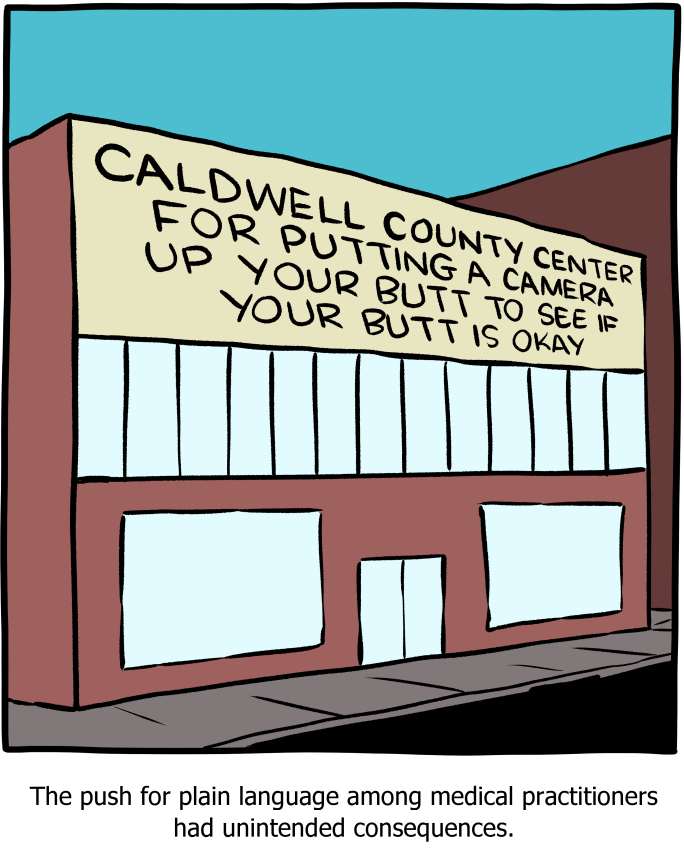Plain Language
« previous post | next post »
Today's SMBC:
Mouseover title: "Nextdoor to the Center for Wank In a Cup and We'll Check it Out."
The aftercomic:

Google Scholar's hits for medical "plain language" colonoscopy confirms that the issue exists.
And the search turns up things like this table from Kilbridge et al. "Lack of comprehension of common prostate cancer terms in an underserved population", Journal of Clinical Oncology 2009, which suggests that the consequences, whether or not unintended, are not unanticipated.

KeithB said,
October 10, 2022 @ 8:00 am
I am too much of a prude to say this in public but:
At the Colonoscopy center early in the morning you can find a lot of sore ass-holes. Not only that, but there are a lot of irritated anus's, too.
Barbara Phillips Long said,
October 10, 2022 @ 4:37 pm
Physicians don't deal well with the news that they need to communicate at a level and in a manner that is effective with the audience, in my experience.
When I was substitute teaching in a public school in Kentucky, a doctor griped to me about how he gave out "plenty of information" to his patients and he could see them letting go of the papers in the parking lot. He was angry his instructions were treated like litter. I asked how many of his patients were active, successful readers. He didn't know, and he *really* didn't like me pointing out things like the introduction to the American Heart Association cookbook he was recommending had a reading level suitable for graduate students. I suggested videos, and he was affronted. Other doctors I have raised the issue with have reacted similarly except for one or two.
Back to the cartoon: Isn't the "Center for Wank in a Cup…" in the U.K.? In the U.S., I would expect the "Center for Jerk Off in a Cup…" or some variation, particularly in more rural areas.
Andreas Johansson said,
October 11, 2022 @ 1:23 am
I once had to translate to an elderly acquaintance the information she'd been given about heart surgery she'd undergone.
And she *is* an active, successful reader, just not one much familiar with medical Latin.
Peter Grubtal said,
October 11, 2022 @ 4:20 am
As he was preparing for a rectal examination of a friend of mine, the doctor said "this is very infra dig…".
Cervantes said,
October 11, 2022 @ 10:27 am
As it happens, I study physician-patient communication for a living. The biggest problem is not that doctors use jargon or aren't good at explaining complex issues to people who don't have the background knowledge and vocabulary. Yes, those are real. But for the most part, they don't really try to explain anything at all, they just tell people what to do. And they aren't very good at that either. Obviously people who are referred to a colonoscopy get the basic info about what is going to happen — I would imagine hardly anyone is surprised by that. But they probably don't understand the rationale for it or have any basis for making their own decision about whether to do it.
Rick said,
October 11, 2022 @ 2:40 pm
This brings to mind one of my favorite book (series) titles: Medical Abbreviations: 55000 Conveniences at the Expense of Communication and Safety.
medrecgal said,
October 11, 2022 @ 5:30 pm
Fascinating post…one that brings me back to some of my own experiences as a patient. I happen to have a lot of background involving medical terminology, and I find that physicians appreciate being able to talk in their own jargon with a patient who understands it rather than having to find ways to turn it into "common words" for those who have never been exposed to the terminology. But I can also appreciate the flip side, i.e., the need for those with specialized terminology (like physicians) to bring it down to a simpler level for the majority of the people they interact with. I'm sure it's not an easy thing to do, but definitely a necessary one for the safety and satisfaction of all involved.
J.W. Brewer said,
October 11, 2022 @ 6:01 pm
A recent example of actual movement toward "plain language" in U.S. medical culture is the rise of "fatty liver disease" as a synonym used by actual M.D.'s for what was formerly called hepatosteatosis or hepatic steatosis.
Note that the cognitive demands on medical students in mastering all the learned jargon must have increased over the course of the 20th century as the percentage of incoming med-school classes with prior classical education, of the sort that would make most of the ancient-Greek-derived technical terms semantically transparent, plummeted. To be fair, I'm one of the tiny percentage of American patients who did study ancient Greek for a few semesters once upon a time but στέᾱρ, στέᾱτος (3d declension neuter noun, glossed as "hard fat, tallow, suet") isn't a lexeme I recall learning although I may well have seen it back then and failed to retain it.
James Wimberley said,
October 12, 2022 @ 8:03 am
Thought experiment. You have a Larry Niven autodoc, a perfect medical robot applying the best algorithms for diagnosis and treatment, and a comprehensive set of treatments from drugs (presumably synthesised to order) to surgery. How would you as its patient want the autodoc to talk to you?
Jonathan Smith said,
October 12, 2022 @ 8:10 am
But at least as far as the topic of the cartoon is concerned, the larger issue is that doctors are just as squeamish as the rest of us, i.e., don't like talking about poop and butts… this cultural complex is so severe that English seems unable even to develop plain-language words for such concepts, in stark contrast to, say, any Chinese language. And so… general anesthesia during colonoscopy, etc.
wanda said,
October 12, 2022 @ 10:59 am
"The biggest problem is not that doctors use jargon or aren't good at explaining complex issues to people who don't have the background knowledge and vocabulary. "
Yes, once you have this specialized knowledge, it's hard to remember when you didn't have it and thus to communicate at a level to people who don't know it.
I run into this problem a lot because I teach introductory college biology. It's hard to remember that my students know very little, and sometimes they know less than nothing- they believe things that are actively wrong. For example, my colleague who teaches the same population found that a small number of students misinterpreted the statement that cancer is a disease of uncontrolled cell growth. She found that they thought that the individual cells would keep getting bigger and bigger! That is not something I could ever imagine believing, especially because I started reading science materials at an early age. And our students are at least in college and trying to learn biology. I know that the lack of knowledge is worse in the general population.
wanda said,
October 12, 2022 @ 11:02 am
Ended the previous comment too early.
I completely sympathize with physicians who are just done with explaining things to people who know less than nothing or who don't have the time to explain things to people and just bark orders at them. I never expect doctors to explain anything and research things on behalf of my family, especially my mom who knows far less than nothing about health.
Kristian said,
October 12, 2022 @ 11:17 am
I don't think doctors are squeamish, English just isn't productive in producing "English" vocabulary of this kind. There aren't any "English" words for many non-embarrassing medical terms or many scientific concepts. I was surprised in Sweden to hear high school students ask what words like "semipermeabel" were in Swedish (they wanted it translated to "halvgenomtränglig"). (Incidentally, the impression I sometimes get from this site is that (English speaking) linguists think it is silly for people to be concerned about having native terms for things instead of just borrowing English words.)
J.W. Brewer said,
October 12, 2022 @ 11:30 am
Sometimes it can lead to confusion when medical jargon mixes normal English words (with specialized technical meanings) in which Latin/Greek-derived technical vocabulary. Maybe 5 or more years ago I slipped and fell on a wet sidewalk, and injured my forearm with what got diagnosed as a "radial neck fracture." Which sounded initially quite alarming because I parsed it as [radial [neck fracture]] rather than [[radial neck] fracture].
But it turns out that "neck" rather than something more opaque-sounding is the technical way of referring to a particular subpart of the bone known as the "radius." (The "neck" is of course right next to the "head" of the bone, and a subsequent MD looking at the same x-rays thought "radial head fracture" would be a more apt description, but by then I'd acclimated myself to the jargon.)
Philip Taylor said,
October 12, 2022 @ 2:42 pm
I won't name either the book or the author, but I can say that when working on a particular text with a particular author, I was unable to persuade her that using the words "diameter" (geometry) and "radius" (bone) within a few words of each other was not best calculated to help the reader understand the meaning of "radius" in this context at first sight …
Bob Ladd said,
October 12, 2022 @ 3:02 pm
The medical jargon business cuts both ways. I remember when one of my children – aged about 13 months – had a bad croup attack and the doctor (who actually made an emergency house call, in the days when the National Health Service really was just that) explained croup to me in terms of the what happens in the "voice box". I decided not to tell her I knew very well what a larynx is, but I did at least understand from her explanation why inflamed vocal folds in a child-sized larynx might interfere with breathing.
Peter Taylor said,
October 18, 2022 @ 4:41 am
@Barbara Phillips Long, it would be a Centre in the UK.
I'm puzzled by the use of "butt" in the cartoon, though. I'd have thought that it's more a centre for "putting a camera up your anus to see if your guts are ok".